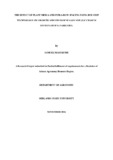Please use this identifier to cite or link to this item:
https://cris.library.msu.ac.zw//handle/11408/2465| Title: | The effect of plant media and intra-row spacing using bud chip technology on growth and yield of sugarcane (saccharum officinarum l) varieties. | Authors: | Masukume, Samuel | Keywords: | Economic benefit analysis Plant media Intra-row spacing |
Issue Date: | Nov-2016 | Publisher: | Midlands State University | Abstract: | The experiments were conducted at Zimbabwe Sugar Association Experiment Station, Chiredzi, Zimbabwe during the period 2015-2016 to study the growth, yield and economic benefit analysis of sugarcane as influenced by plant media, intra-row spacing and varieties. Two experiments were conducted with the 1st experiment that evaluated the best plant media to raise sugarcane bud chips and the 2nd experiment on determining the best intra-row spacing that gives best yield, using different sugarcane varieties. Effect of plant media and variety experiment was arranged in a 4*2 factorial design in Randomised Complete Block Design (RCBD) replicated three times, with four plant medium (Composted filter cake, Composted pine bark, Composted cattle manure and Top soil mix) and two varieties (ZN7 and ZN10). Data was analysed using GenStat 14th edition and separation of means was done using LSD at (P<0.05). Analysis of variance revealed that emergence % was significantly (P<0.05) affected by the main effects of varieties and types of plant growth media. There was interaction (P<0.05) of treatments affected plant height at 6 WAP, shoot dry weight, root dry weight and total biomass accumulated at 6 WAP. The study generally showed that ZN10 is a fast growing variety and Composted filter cake is the most suitable plant media that can be used for raising sugarcane bud chips. Therefore, to produce sturdier speedlings, Composted filter cake can be used by farmers when propagating bud chip of varieties ZN10 and ZN7. Moreover, further study need to explore and determine mixing ratio for Composted pine bark and Composted filter cake as well as the use of plant growth promoters to enhance bud emergence and growth of speedlings in the nursery. Effect of intra-row spacing and variety on growth, yield and economic benefit analysis of plant cane raises through Bud chip technology was done in 2015-16 cropping season. The experiment was a6*2 factorial in RCBD with two varieties (ZN10 and ZN7) and six intra-row spacing (Double row planting of three eyes setts, 0.3 m bud chip speedlings, 0.5 m bud chip speedlings, 0.7 m bud chip speedlings, 0.9 m bud chip speedlings and 0.5 m single eyed speedlings) replicated three times.All intra-row spacings were comparably the same with regards to plant height with the exception of 0.9 m which recorded the least plant height (26WAP). Double row planting of setts recorded the highest tiller peak on tiller population ha-1which was significantly different from all other treatments (14 WAP) followed by normalization to optimum shoot population for all treatments with the exception of 0.9 m bud chip speedlings which failed to reach the normal plant population. The results indicate that 0.7 m bud chip speedling and 0.9 m bud chip speedling was superior to any other treatments with respect to tiller population per stool, leaf nitrogen content % and cash income (return per dollar and new income generated from saving in seed) and the values reduced with decreasing intra-row spacing. Significantly highest number of millable stalks per ha was recorded in conventional double row planting of three eyed setts and reduced progressively with an increase in intra-row spacing. Results revealed that sugarcane had the capacity to compensate on cane and sugar yield under various intra-row spacing and varieties, thereby resulting in comparable yield values (P<0.05).Sugarcane farmers are recommended to use an intra-row spacing of 0.9 m when using bud chips speedlings so as it compensate on yield, therefore more revenue from high cane yield ha-1, sugar yieldha-1 and income realised from saving in seed material is realised. Varieties ZN7 and ZN10 can be used when propagating sugarcane from bud chip speedlings as they compensate under different intra-row spacings to give the same final cane and sugar yield. Further investigations are required to determine the progressive ratoon growth of sugarcane crop established through bud chip speedling so as to determine its feasibility. Innovation on mechanical planting of speedlings may be done to on human labour requirements during planting. | URI: | http://hdl.handle.net/11408/2465 |
| Appears in Collections: | Bsc Agronomy Honours Degree |
Files in This Item:
| File | Description | Size | Format | |
|---|---|---|---|---|
| MASUKUME .pdf | Full Text | 1.45 MB | Adobe PDF |  View/Open |
Page view(s)
162
checked on Apr 15, 2025
Download(s)
112
checked on Apr 15, 2025
Google ScholarTM
Check
Items in MSUIR are protected by copyright, with all rights reserved, unless otherwise indicated.



